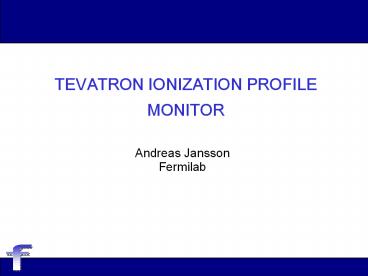TEVATRON IONIZATION PROFILE MONITOR - PowerPoint PPT Presentation
Title:
TEVATRON IONIZATION PROFILE MONITOR
Description:
TEVATRON IONIZATION PROFILE MONITOR Andreas Jansson Fermilab – PowerPoint PPT presentation
Number of Views:123
Avg rating:3.0/5.0
Title: TEVATRON IONIZATION PROFILE MONITOR
1
TEVATRON IONIZATION PROFILE MONITOR
- Andreas Jansson
- Fermilab
2
People
- AD
- C. Rivetta
- L. Valerio
- J. Zagel
- B. Dysert
- CD
- M. Bowden
- R. Kwarciany
- PD
- Bross
- K. Bowie
- H. Nguyen
- T. Fitzpatrick
Also help from D. Harding (TD), V. Kashikin
(TD), T. Zimmerman (PD), Z. Tang (PD) and the Tev
Techs
3
Talk outline
- Motivation for IPMs
- Challenges in Tevatron
- Design of Tevatron IPMs
- Tests
- Pictures from the tunnel
4
Motivation
5
IPM working principle
- Measure distribution of rest gas ionization by
- Drifting ions onto a detector using an electric
field, or - Drifting ionization electrons onto a detector
using a EB field.
Beam
-
6
Challenge I Small beam size
- Small beam size
- Low gas pressure
7
Challenge II Beam separation
Y mm
Inj. old helix
Inj. new helix
Flattop
X mm
? 20 ? mm mrad ?p/p 7.5 10-4
One and three sigma contours
8
Challenge III Residual gas pressure
- Gas pressure at E0 before 2004 shutdown was in
low 10-8s, slated to be improved - Based on estimated gas composition, expect about
1000e/bunch for a ¼ mm ?10 cm detector at 3 108
torr and 2.7 1011 protons/bunch. - Need for a local vacuum bump after vacuum
inprovements.
9
Challenge IV Parasitic signals
10
Simulations
- Injection is most difficult (fewer counts per
channel). - Signal per bunch is small, but gain limited by
MCP saturation effects from total (proton)
signal. - Need about 300 primaries (per bunch) for 10
beam width accuracy (requires gas injection). - Higher accuracy can be obtained by averaging many
turns (ramp measurement).
11
Fermilab QIE8 ASIC
- Charge Integrating Encoder (QIE)
- Developed at Fermilab
- Used by KTeV, CDF, Minos, CMS
- Frequency range 7-53 MHz
- No deadtime.
- LSB 2.6fC in logarithmic mode, 0.9fC in linear
mode - Dynamic range gt104 in logarithmic mode
- Can achieve noise of O(1fC)
12
MCP test stand
13
MCP saturation
Turn
Measured emittance vs MCP voltage in MI IPM at
different points in the acceleration cycle
- MCP output current per unit area is limited by
MCP pore recharge time. - Onset of saturation observed in MI IPMs, as
expected from calculations. - Will abandon Chevron configuration since extra
gain can not be utilized (allows to run at higher
bias).
14
QIE test stand
- Using laser based PMT test setup in Lab6
- KTeV test board modified with CMS-QIE
- Observed good linearity and insensitivity to
clock phase
15
Tracking transverse displacement
B0.2 T, E100kV/m
16
Cable tests
- Stepping QIE clock phase w.r.t the incoming
pulse, can improve time resolution - Derivation of composite signal yields the
original pulse - Used to study reflections due to connectors in
front-end cabling
17
Rad level measurements
- Reading 125 mrad/h during normal running at 4.5
feet - 18 years to 20 krad!
18
Component rad tests
- Tested commercial TI serializer in Tevatron
tunnel for gt200 days. - Previously tested (by others) for total dose
Mrad. - Only handful of link errors seen.
- One latchup candidate, cleared by cycling power.
- Observed error rate should not affect operation.
19
Detector design
- Based on MI eIPM prototype
- Flange-mounted detector for quick installation
- Many modifications
- Better screening
- Provisions for calibration device
20
Anode board
21
Magnets
- Single corrector for simplicity.
- Electromagnets chosen.
- Can be turned off to verify effect on measurement
and machine. - Bought from outside manufacturer.
22
Field quality
- E-field is not perfect longitudinally
- EB component produces a small transverse drift
velocity - To first order, this generates a rotation of the
beam image, removed by beam-based alignment - Higher order terms distort the beam image, expect
order 30 nm rms effect on beam size.
23
DAQ system
- CMS-QIE front end in tunnel.
- Serial data uplink on optical fiber
- Receiver and data buffer in upstairs PC
- Timing clock QIE settings supplied from PC
thru cat-5E cable
Host PC (LabView)
Data Buffer (PCI)
Timing card (PCI)
Timing fanout
QIE cards (16x 8 ch)
24
Timing card
- Produces the 15MHz (2/7 RF) FE clock
- Decodes and transmits beamsync clock (p pbar)
injection events - Transmits QIE settings
- Separate version of card will decode TCLK/MDAT
25
Timing scheme
396 ns (21 buckets)
p/pbar separation
RF
2/7
1/7
26
Front end card
- 8 channels (CMS QIE) per board.
- Data is serialized by CERN GOL ASIC (rad hard)
and sent thru fiber - Timing fanout board cleans up and distributes
clock and timing signals
QIE card
timing fanout
27
Data buffer card
- Doubles as BTeV L1 data buffer prototype.
28
Controlled N2 leak system
Leak 1
Ion pump
Leak 2
Isolation valve
29
Differential pumping scheme
30
Controlled N2 leak tests at E4R
leak on
Red traces IP and IG in leak chamber Green, Blue
and Cyan IPs and IG in main chamber
31
Tunnel installation
32
Conclusions and outlook

